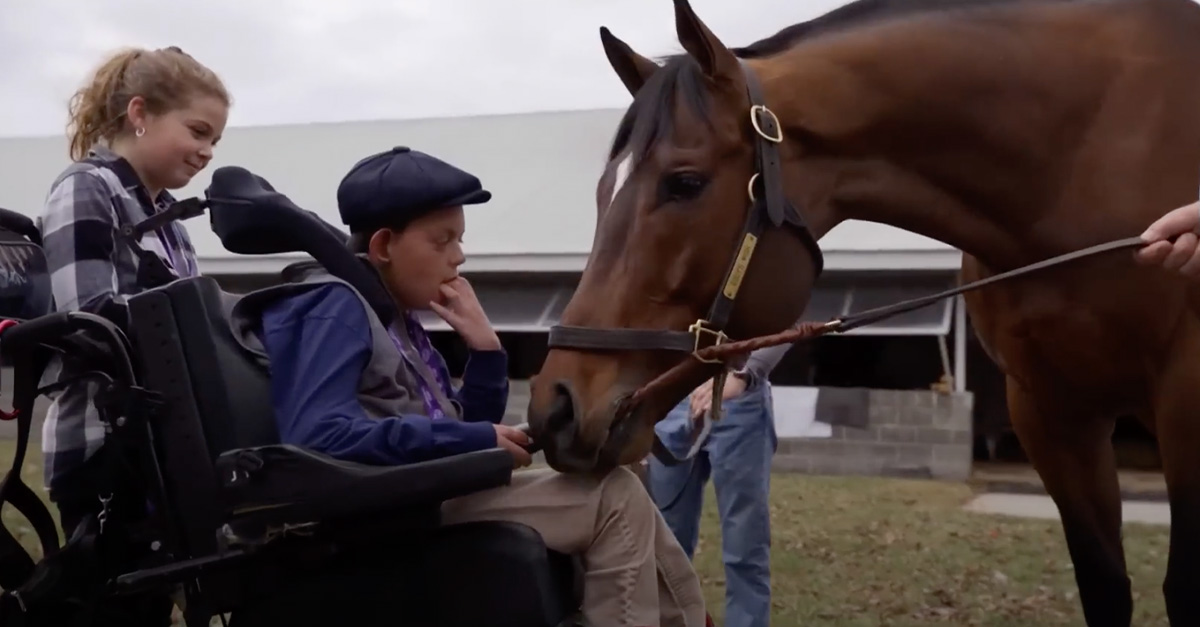


Get a free copy of Parental Rights & Education when you subscribe to our newsletter!

Into our national debate on life vs. choice charges the feel-good story of Cody Dorman and Cody’s Wish, powerfully illustrating why all children deserve the chance to live according to God’s plan and timing.
When the Breeder’s Cup World Championship horse racing series was held at Keeneland Racetrack in Lexington, Kentucky, last weekend, the focus was expected to be, appropriately enough, on the horses. Instead, the talk among racegoers and the international media was about a teenager named Cody Dorman and his “incredible bond” with namesake Cody’s Wish, a four-year-old colt favored to win the prestigious Breeder’s Cup Dirt Mile.
The story, the media agreed, seemed straight out of a Hollywood script, though it was really more in line with a C.S. Lewis novel: A boy, suffering from a rare congenital disorder, nonverbal, bound to a wheelchair and a feeding tube, and a champion thoroughbred racehorse, perfectly formed, of noble pedigree and the most powerful of connections, stepping forward to illuminate the boy’s story and give him the victory and glory he never could have achieved on his own.
The two first met in 2018 during a Make-A-Wish Foundation event at nearby Gainsborough Farm when the boy was 12 years old and the horse just 6 months. “We had 40-odd foals on the farm that day and we could have chosen any one of them,” recalled farm manager Danny Mulvihill. “What happened from there was special. The foal just came up, laid his head down in Cody’s lap, and just spent some quiet time with Cody.”
“It was one of those magical moments,” said Mary Bourne, the farm’s office manager who later named the foal Cody’s Wish.
That the moment happened at all was certainly against the odds, given Cody’s bleak beginning and prognosis. Shortly after birth, he had been diagnosed with Wolf-Hirschhorn syndrome, a chromosomal defect that can cause developmental delays, intellectual disabilities, and physical ailments that range widely from mild to severe. The condition, the result of a partial deletion of the 4th chromosome, is rare; it’s estimated to occur in only 1 in 50,000 births.
It’s also a condition for which prenatal testing is being expanded and for which doctors are now likely to recommend termination in utero based on a presumption that the quality and length of life for the child will be poor and extremely limited (although updated studies show that most will survive into adulthood).
Doctors told Cody’s parents that their newborn son would not live past the age of two.
But Cody, it turned out, was a “fighter” with a “no-quit mentality,” according to his father, Kelly. He passed that milestone birthday and thrived, despite dealing with a continuous onslaught of seizures and surgeries. While the care routine could be challenging, his mother, Leslie, stated that she and her husband “wouldn’t trade any of it. He has taught us so much. He has blessed us.”
And there was much joy. Cody loved to go fishing with his grandfather. He welcomed a little sister, Kylie, who turned out to be as devoted to him as were his parents. And when Cody was 12, the community came together and helped him purchase a tablet equipped with cutting-edge assistive technology that for the first time allowed him to communicate his needs and wants and even tell “knock-knock” jokes.
Soon thereafter, Cody told his parents that he wanted to meet a racehorse.
The bond that developed between boy and horse during that first face-to-face meeting has never diminished. Every time Cody was taken to visit Cody’s Wish in the years ahead, the now grown and high-spirited colt would, nonetheless, quietly walk over to Cody and drop his head down so the boy could feel his breath and touch his nose. And every time Cody watched him race, Cody’s Wish would win. Eventually, the horse had amassed an impressive enough record to qualify for the Breeder’s Cup and a chance to prove himself against the world’s best runners.
On November 5, Cody Dorman was situated near the track rail, decked out in a specially made pinstripe suit and the flat cap popular among horsemen, as cameramen and photographers circled around him, zooming in on his face, hoping to catch his reaction as Cody’s Wish made his run for the history books.
The colt did not disappoint. Far back early on and seemingly out of contention, Cody’s Wish was suddenly on the move, roaring up on the outside as the field came out of the final turn and matching the leader stride for stride as they raced down the stretch. As they approached the finish line, Cody’s Wish pushed his nose in front.
“The wish has come true!” the track announcer yelled over the loudspeaker. “That one’s for you, Cody!”
As the horse and his connections and the boy and his family made their way into the winner’s circle, a burst of deafening applause exploded among the crowd and many wiped away tears. Cody too could be seen happily weeping.
For everyone there that day, language was rendered powerless. One observer noted that the moment was “just too incredible and beautiful” to describe, before concluding that it was simply “one of those moments I would love to relive for the rest of my life.”
The question remains, though: In an era when well-packaged media dramas are the norm, why did Cody’s story resonate so strongly?
To me, there are two clear answers: First, in the largest and most important sense, Cody’s story is our story. Like Cody, all of us are born with a congenital disorder, the disorder of sin, though this condition is pervasive, not rare (Rom 3:23). By the world’s standards, most of us may appear fully capable, perfectly formed even, but in reality, we are all broken and bound, unable to pull ourselves up by our own strength, unable to avoid the inevitable suffering and death that eventually comes with such an affliction (Romans 6:23).
Like Cody, we are all in need of someone willing to champion us. One who answers us when we humbly come to meet Him, who willingly seeks us and draws near in spite of our condition to comfort us, and who runs the race for us and gives us the victory and the glory that we could never achieve on our own.
That champion, of course, is Jesus, who saves us (Luke 19:10) and bears our burdens (Psalm 55:22) — and whose “power is made perfect in weakness” (2 Corinthians 12:9).
To be clear, Cody’s Wish is not Jesus, any more than is Aslan, the allegorical lion and king made famous by C.S. Lewis in The Chronicles of Narnia. But if Christians truly believe that God moves among us and makes His presence known in mysterious ways, there can be little doubt that the timing of this real-life, modern-day Christian allegory is not a coincidence.
Which leads us to the second reason why this story is so captivating: It affirms that everyone has the right to take their shot at life, even if that life promises trials and suffering.
And yet this affirmation comes at a time of severe logical and moral dissonance. One need only look at the scene of a society celebrating the life and humanity of Cody Dorman even as it increasingly embraces the eugenic principle that other children conceived with less than perfect bodies or under less than perfect circumstances are better off not ever being born.
Indeed, in the days following the Breeder’s Cup triumph of Cody’s Wish, Kentucky voters failed to codify the right to life in the state constitution, while three other states voted to allow abortion for any reason up until just before the moment of birth.
To put a finer point on it, consider the recent study published in BMC Pregnancy and Childbirth designed to identify ultrasound readings indicating Wolf-Hirschhorn syndrome in order to help doctors refer more suspect cases to genetic testing and obtain definitive “prenatal” diagnoses of the condition.
Just as Iceland has managed to nearly eradicate the incidence of all Down syndrome children via universally available genetic counseling, testing, and abortion, there is little mystery regarding the intent in studying and pushing more expansive and accurate diagnostics for Wolf-Hirschhorn syndrome.
With such a diagnosis, parents report being told that there isn’t “any kind of hope,” and doctors often pair their discussion of positive test results with a helpful offer to quickly schedule a termination procedure. To wit, of the 18 fetuses positively diagnosed with the condition and examined as part of the BMC study, 15 of them were thereafter electively aborted, including one at 33 weeks’ gestation.
Into the face of such horrors charges the feel-good story of Cody Dorman and Cody’s Wish, powerfully illustrating that the value of a human life is not about health status or moments in time or the desperate pursuit of avoiding any and all suffering.
“Symbolism,” C.S. Lewis wrote, “exists precisely for the purpose of conveying to the imagination what the intellect is not ready for.”
Perhaps the story of the two Codys is exactly what today’s choice-happy warriors and their apathetic enablers need in order to innately understand that all children deserve the chance to live according to God’s plan and timing. Whether it’s for a day, two years, or a century. Whether someone’s start in life appears bleak or full of potential. Whether they are planned or unplanned. Whether they are destined to live out an improbable adventure that gets international media attention or to live out their days in total obscurity.
All lives are valuable, all have meaning, and all have the right to experience God’s love and accept His redemption.
And perhaps, too, all will recognize that though, like Cody, we initially face a grim reality, it can be transformed into a glorious future — if we choose to believe in and trust in the One who truly loves us, fights for us, and has already won the victory.
Ready to dive deeper into the intersection of faith and policy? Head over to our Theology of Politics series page where we’ve published several long-form pieces that will help Christians navigate where their faith should direct them on political issues.

Notifications